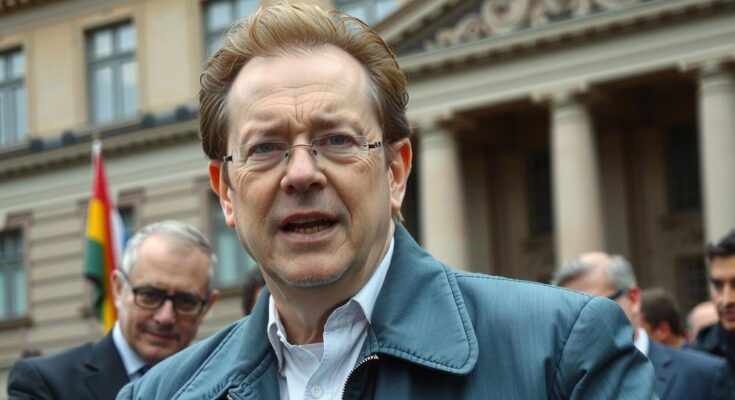Elon Musk’s endorsement of the far-right AfD party in Germany has sparked a political uproar, with officials accusing him of attempting to influence the upcoming national elections. While some political leaders likened Musk’s actions to foreign interference, criticisms focus on the party’s anti-EU stance and economic implications. The controversy has raised concerns about the impact of influential figures in national politics.
In an escalating political situation, Elon Musk has been accused of attempting to influence the forthcoming German national elections scheduled for February 2025. A spokesperson for the government stated that while Musk is entitled to his opinions, his recent endorsement of the far-right Alternative for Germany (AfD) party is inappropriate and potentially detrimental. The criticism follows Musk’s assertion in an opinion piece that the AfD represents a “last spark of hope” for Germany, prompting backlash from various political figures.
The German political landscape is currently dominated by the Christian Democratic Union (CDU) with 30 percent support, closely followed by the AfD at 19 percent, according to POLITICO’s Poll of Polls. Musk’s remarks have drawn sharp rebukes, exemplified by Social Democrat leader Lars Klingbeil, who equated Musk’s actions to those of Vladimir Putin, positing that they both seek to empower anti-democratic factions. Furthermore, Saskia Esken of the Social Democrats suggested Musk’s motivations are purely financial, warning that his actions are primarily aimed at personal enrichment.
The potential implications of the AfD’s anti-European Union stance have also come under scrutiny. Friedrich Merz of the CDU characterized Musk’s statements as “intrusive and presumptuous,” expressing concern that a potential “Dexit” could harm Germany’s economy significantly. He reminded that the AfD had opposed the establishment of Musk’s Tesla factory in Brandenburg, showcasing the complexities of his relationship with the party.
Despite the severe backlash, Musk has not publicly addressed the criticisms; however, he did share a photograph from the AfD’s chancellor candidate, Alice Weidel, which was utilized in their election campaign. His recent endorsements extend beyond Germany, supporting figures like Nigel Farage in the UK and Giorgia Meloni in Italy, further highlighting his alignment with populist and right-leaning politicians across Europe.
The recent statements and actions of Elon Musk regarding German politics have ignited controversy within the country’s electoral framework. Musk’s vocal support for the Alternative for Germany (AfD) party, known for its far-right policies and anti-EU sentiments, raises critical issues about foreign influence on national elections. This situation exemplifies how prominent figures in the tech industry can impact political discourse and electoral outcomes, particularly in nations grappling with populism and polarized politics. Against this backdrop, the responses from various political actors in Germany reflect the deep-seated concerns surrounding electoral integrity and the consequences of endorsing anti-democratic forces.
In summary, Elon Musk’s endorsement of the Alternative for Germany party has stirred considerable political contention ahead of the upcoming elections. The German government and various political leaders have voiced significant concerns about his influence and the implications of supporting a party with far-right leanings. As this scenario unfolds, it highlights the intersection of technology, politics, and the potential challenges posed by foreign figures in influencing democratic processes.
Original Source: www.politico.eu




